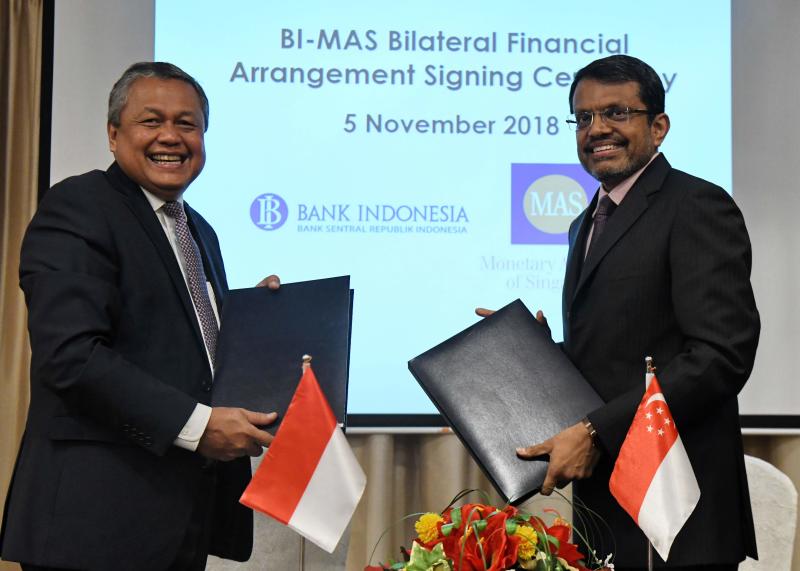MAS, Bank Indonesia set up US$10b bilateral financial arrangement
Sign up now: Get ST's newsletters delivered to your inbox

Bank Indonesia (BI) governor Perry Warjiyo (L) and Monetary Authority of Singapore (MAS) managing director Ravi Menon exchange documents after a signing ceremony for the bilateral financial agreement.
PHOTO: AFP
SINGAPORE - The Monetary Authority of Singapore (MAS) and Bank Indonesia (BI) on Monday announced they have established a US$10 billion bilateral financial arrangement to enable the two central banks to access foreign currency liquidity from each other, if needed, to preserve monetary and financial stability.
The two agreements were signed on Monday by BI governor Perry Warjiyo and MAS managing director Ravi Menon, following earlier announcements by Indonesian President Joko Widodo and Prime Minister Lee Hsien Loong at the Singapore-Indonesia Leaders' Retreat on Oct 11, 2018. The two leaders had asked BI and MAS to work out a bilateral financial arrangement that can build confidence in each other's economies.
Said Mr Menon: "Economic fundamentals in the regional economies remain sound. But markets can sometimes overreact in the face of heightened uncertainty. This bilateral financial arrangement will instil confidence amongst investors. It also reflects the close relationship between Indonesia and Singapore."
Mr Warjiyo said: "The initiative reflects the strengthened bilateral monetary and financial cooperation between Singapore and Indonesia, and indicates the commitment of the authorities of Indonesia and Singapore to maintain financial stability amid the lingering uncertainty in the global financial market.
The arrangement, which will be in place for one year, comprises two agreements. The first is a new local currency bilateral swap agreement that allows for the exchange of local currencies between the two central banks of up to $9.5 billion or 100 trillion rupiah.
The second part is an enhanced bilateral repo agreement of US$3 billion that allows for repurchase transactions between the two central banks to obtain USD cash using government bonds of major countries as collateral. These include US treasuries as well as Japanese and German government bonds. The amount is a tripling from the current size of US$1 billion.


